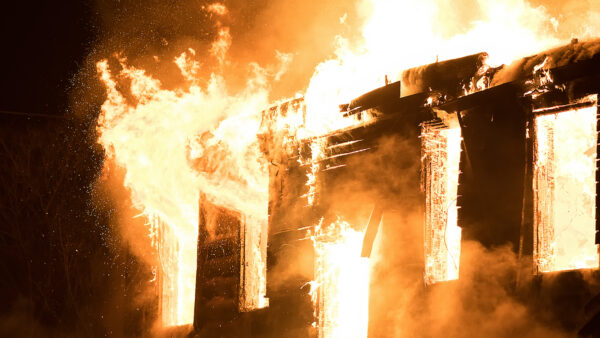H&S: does our house of cards still stack up?
Over the last decade the industry has built a complex structure of health and safety competence cards and testing. But now the HSE is suggesting we are placing too much reliance on a flimsy structure – at rising personal cost. Elaine Knutt reports. Illustration by Nathan Daniels.
Is our house of cards really keeping construction safe? Or is the culture of a health and safety “competence” – cards and testing, training and re-training — becoming an end in itself and increasingly detached from a common-sense view of competence in health and safety? That was the question raised by the HSE’s chief inspector of construction Philip White in the January issue of CM, when he called for less focus on card schemes and more focus on a meaningful safety culture, an article that soon became the most-read page on CM’s website.
White’s call to rationalise the industry’s multiple card schemes tackles an issue that’s dominating online discussion forums. A debate in the LinkedIn CIOB group took up the issue of what “competence” is in terms of the CDM Regulations and whether any card or qualification scheme can test and measure it. In other words, will the ConstructionSkills Health and Safety multiple choice “screen test” – or even the 97% pass rate Site Management Safety Training Scheme (SMSTS) – really sort the people you’d want to work on your project from the ones best avoided?
Register for free or sign in to continue reading
This is not a paywall. Registration allows us to enhance your experience across Construction Management and ensure we deliver you quality editorial content.
Registering also means you can manage your own CPDs, comments, newsletter sign-ups and privacy settings.
Right now there’s discussion on the LinkedIn Site Manager UK group about what members would do to reform the Construction Skills Certification Scheme (CSCS), the main card scheme that has 10 specialist competence schemes affiliated to it. Questions on the thread include the logic of forcing every visiting tradesperson to demonstrate H&S competence and get a CSCS card — including, in one post, the man who came to install the Costa Coffee machine.
For CIOB members, however, the main issue with the CSCS scheme continues to revolve around the black Managers card, currently awarded only to holders of an NVQ Level 6. So if you’re an MCIOB site manager and don’t have the card, the inference among employers and recruiters could be that you’re less safety competent than someone with a lower qualification.

One recent thread on the HSE’s own online forum began when an HR manager asked whether site staff with a CSCS Gold Supervisors Card needed to renew their SMSTS “ticket”. Responses covered various interpretations of the legal status of both qualifications, but no one could give her a direct answer. Behind the question lay a general lack of clarity over cards’ status, and a lack of mutual recognition between schemes. That uncertainty – among clients and construction employers – in turn leads to a costly and inefficient “get ’em all” approach.
Also on Site Manager UK, there’s been a heated debate over the SMSTS, a five-day course covering the basics of safe site management. It was given a new badge of authority in February 2012 when the UK Contractors Group adopted it as one of two acceptable health and safety qualifications for site managers (the other being a four-day IOSH course). The UKCG’s aim was to raise standards and improve site safety, but in doing so it’s drastically narrowed the definition of what you need to “competently” manage health and safety on site – with possible unintended consequences (see below).
Qualifications the UKCG has excluded include the NEBOSH Construction Certificate, the NVQ 6 (confusingly), and the CIOB Level 4 and 5 diplomas. CIOB head of education Rosalind Thorpe has been receiving emails from members concerned about this and the UKCG’s stance, particularly from self-employed members finding that SMSTS is cited in job specs while their qualifications are ignored. “It does frustrate people who’ve got years of experience and good qualifications, but they see the benchmark falling,” says Thorpe, who has flagged up the issue with UKCG.
More fundamentally, Thorpe questions whether SMSTS – which isn’t part of Ofqual’s Qualification and Credit Framework – is a valid assessment of “competence”. “It’s a multiple choice test with a 98% pass rate, how does that relate to competence?”
Meanwhile, some CIOB members fear their ineligibility for a CSCS Black Card could stymie future opportunities. “CSCS cards aren’t mandatory, but they might as well be,” says Tony Knott MCIOB. “When I come on to my next position and I’m asked if I have a Black CSCS card, the answer’s no. In the current climate, people need these cards. The government is trying to get the industry going at the moment, and putting up these barriers isn’t helping.”
Dr Billy Hare FCIOB, senior research fellow at Glasgow Caledonian University and a member of the CIOB’s health and safety panel, has direct experience of the problem. “My father in-law had worked for a large contractor, then moved to a local builder that didn’t see the relevance of CSCS cards, so no training or updating took place. Now he’s in a position where he can’t get job because he can’t get a CSCS card – the CSCS won’t let him back in without an NVQ, and he’s too late to apply under grandfather rights. So it can become a barrier to perfectly competent people getting into work.”

There is a general lack of clarity over cards’ status and a lack of mutual recognition between schemes
Misinterpretation
That situation is an example of the unintended consequences of over-reliance on card schemes and lack of a common sense approach — precisely what the HSE is reacting against. It argues that parts of the industry have misinterpreted what health and safety competence actually is, leading to the dominance of a card culture and lack of an overall, deeper cultural change.
Its concerns date from research it commissioned with ConstructionSkills and published in September 2011. The Pye Tait Review established that the industry had 300 cards from more than 40 certification schemes, “a number of which have inconsistent and incompatible requirements and meanings”. It argues that “all such cards should be based on achievement of a nationally-recognised, formal qualification to which other related formal qualifications are mapped, and published, to aid clarity”.
Eighteen months later, an HSE statement prepared for CM talks about the definition of safety competence it endorses. The goal might be individual competence, it says, but responsibility for achieving that is led by employers. In ensuring competence, the HSE stresses that “employers should not rely solely on a worker producing a card, but investigate their underlying skills, experience, training and health and safety knowledge, providing training where necessary”.
Overall, “there should be a shared vision of what competence means, rather than the diverse and incompatible views which currently exist and that clarity should not be restricted to the top of the supply chain. There is a need to rationalise and simplify the carding schemes to the end user”.
That would mean a more joined up approach to training and qualifications: “The HSE would like to see the skills councils, the awarding bodies, the colleges and nationally recognised training providers take greater responsibility for working together, agreeing standards of assessment and coordinating training and achievement of competence in health and safety.”
The statement goes on to single out the role of professional institutions, such as the CIOB. “The competence of professionals working within the construction industry should be the responsibility of the relevant professional bodies and institutions through their entrance criteria and CPD arrangements.”
Competency culture
But the competency culture is partly of the HSE’s own making – and the statement seems to recognises this, saying “we are concerned the CDM regulatory package has not encouraged the correct balance of responsibilities between the employer, the self-employed, the employee and third party card schemes”.
This refers to the approved code of practice (ACoP) to the CDM Regulations 2007, Appendix 4, which sets out detailed criteria to measure the corporate competence of contractors, designers and CDM coordinators. The ACoP then details the standards contractors’ employees should meet, referring to the ConstructionSkills health and safety touch screen test, a fundamental part of the CSCS. And on demonstrating the competence of site managers, the ACoP refers to “SMSTS or equivalent” courses.
The ACoP, along with the rest of the CDM Regulations, is under review, and a consultation document due out shortly should give more indication of what the HSE wants to happen. Nevertheless, these will be long-range sentiments, and the industry wants reform sooner rather than later. What else needs to change to achieve a H&S qualifications framework that improves site safety culture but removes the over-lapping qualifications that add cost and uncertainty?

The CSCS card system is already overdue for an overhaul. New chief executive, Graham Wren, committed the organisation to recognising a wider range of qualifications for black Managers cards, and also to reforming operatives’ green card — but that was back in July and a spokesperson confirms that little progress has been made since. The problem seems to be a complex governance structure, whereby three unions and four industry trade bodies all send representatives to the owners’ committee and the scheme’s board.
Dr Billy Hare suggests that a more radical overhaul is needed. As the H&S test that forms a key part of the CSCS scheme is offered by ConstructionSkills, he suggests that ConstructionSkills could run a similar scheme, but under license from the HSE. “I’m not sure what CSCS Ltd brings to the whole system, and people struggle to differentiate between CSCS and ConstructionSkills anyway,” he says. “But if the HSE could step in and take charge, it would have more credibility.”
The Pye Tait Review, meanwhile, proposes a Construction Industry Card Registration Authority, an independent agency that would have responsibility for monitoring and accrediting card schemes and maintaining a database of card holders and their achievements. Only card schemes that are linked to nationally recognised qualifications and recognised as meeting an independent set of metrics could operate. It suggests that the authority would have a positive effect on the levels of confidence of the public and of employers generally.
But Vaughan Burnand, chair of the CIOB’s health and safety group and a former chair of H&S at the UK Contractors Group, believes that the some of the concerns over cards and schemes are misplaced, as a certain degree of duplication and double-testing is a small price to pay for increased safety on sites. He also resists criticism of the UKCG’s actions, pointing out that the government and public sector relies on the private sector — led by the UKCG — to drive up training standards on construction health and safety. The results are evident in recent statistics, which show accidents concentrated in small, SME-run sites.
But while that’s undoubtedly true, the evidence from those online discussion forums is that the card system simply isn’t seen in that light: it’s too complex, too frustrating, and too divorced from a common-sense perspective of what health and safety competence actually is. It may be that reforms don’t have to be as wide-ranging as Hare and Pye Tait suggest. But even if the current architecture remains in place, it will need a concerted effort on behalf of the industry, ConstructionSkills, the professional institutions and CSCS to ensure the industry can rebuild its faith in it.

On course for better health and safety competence?
If you’ve been on the five-day SMSTS course or two-day refresher recently, you might have found yourself with like-minded professionals, possibly your colleagues on an in-house course, discussing health and safety in depth with a site-experienced trainer. At its best, the industry agrees that SMSTS is a well-designed course that raises the health and safety performance of most site managers.
Or you might have been in a classroom with a fork-lift driver and office administrator looking for better things, listening to a trainer who’d never worked on site, and doing little more than repetitive mock tests — as experienced by two CIOB members who spoke to CM (see below).
The variable standard of training providers is a key issue raising concerns over the course that was last year adopted by the UK Contractors Group — concerns shared by one experienced H&S trainer (see below).
If his views accurately reflect SMSTS provision, then it raises a question mark over SMSTS’s fitness for purpose as a measure of health and safety “competence”. And for self-employed construction professionals, forced to pay for the course out of their own pocket in today’s job market, courses on offer at the weaker end of the market fuel frustrations with the “competence” culture.
By writing the course into its health and safety “training standard” the UKCG has in one sense formalised its long-term support for the SMSTS. But endorsing it (along with a four-day IOSH course) has created a bar to employment for professionals qualified as “competent” by multiple other routes. If they’re not double-qualified, they would be unable to work on any sites run by 34 UKCG members.
In response, the UKCG’s David Lambert says that any industry body that feels its qualification is equivalent to or superior than SMSTS or IOSH can apply to the UKCG to have it written into the training standard. But he added that the UKCG expects the training courses it endorses to be affiliated to ConstructionSkills, AssetSkills or SummitSkills.
But, as an interim measure, Lambert says the UKCG would accept a course if it had the support of an industry body. “We haven’t closed the door on equivalents, but we haven’t been out there searching for them,” he says.
Currently SMSTS is mentioned in 70-75% of site management job adverts on aggregator site careerstructure.com. Managing director Rob Searle says this has increased over the past 12 months, although he was unable to say by how much.
But some construction professionals and observers believe that SMSTS, as the minimum health and safety standard for site managers accepted by UKCG, has actually become a minimum threshold for site manager roles on some smaller sites.

“Employers aren’t looking for [CIOB] diplomas, they’re looking for SMSTS,” says Gary Pollard, a training provider and NVQ assessor at CAD UK. “It’s a problem because of the state of the economy, you flood the market with people who can do SMSTS, and it lets them pitch for work as site managers. It’s [seen as] the minimum legal requirement, so companies will take on people without CSCS or professional recognition or NVQ6.”
While CM has not seen any evidence of this, nevertheless there’s a perception that the course’s “UKCG minimum standard” status has created a situation where this could happen. “The UKCG should be focused on promoting professionalism, not a minimum requirement,” argues Pollard.
The SMSTS is part of a suite of health and safety courses called “Site Safety Plus” administered by a division of ConstructionSkills. Private training providers must have their skills and experience assessed before they can offer the course. For every student, the provider pays ConstructionSkills a registration fee of £35. Providers teach to a syllabus set by ConstructionSkills.
SMSTS: your views
SMSTS training provider: “Anyone who turns up can take the course. Different providers have different views on who can do the course, and I will ask questions to see if they’re suitable. There is also a test they do on Day 1. But I’ve been involved with a number of training companies over the years, so I know what goes on — if they’re pushing through loads of people, are they suddenly going to say you can’t do the course? There will always be good and bad training providers.
“At any time, you can get audited by UK Skills [part of ConstructionSkills] But the quality assurance for NVQs [via Edexcel] involves more stringent and frequent checks. There could be more unannounced visits, what’s the point of telling you they’re going to be there tomorrow? I also run IOSH courses, where trainers have a day at The Grange [IOSH HQ] on how to run the course — it’s not the same with Site Safety Plus .”
Jonathan Lewis ICIOB: “I passed the NEBOSH Construction Certificate in June, so I had to grit my teeth and take a week off work to do SMSTS, but it didn’t really challenge me. Two people struggled with it — a fork-lift driver and one who was office based.
“The trainer knew a lot and was informative, but he’d never been on a construction site. It was a basic course, I felt there weren’t enough case studies. If you have a lot of experienced site managers and foremen turning up it could be a great course – or you could get a poor trainer and not much real–life experience among the students.”
Anthony Porter ICIOB: “There was definitely more emphasis on getting people to pass the course — providers sell themselves on their pass rates [often around 97%]. I could have turned up, sat down and passed the course right away. We spent most of the week doing mock tests, and then the mock test heavily reflected the actual test. I didn’t come away thinking it was a challenge, or that I’d learned something. If I’ve got an NVQ 6 [in construction site management] and NEBOSH [construction certificate], why do I need this?
“It’s great stuff if you’re on full expenses, but there’s a lot of people out there who aren’t freelance by choice. I know lads who can’t pay for these courses without doing something drastic, like selling their car.”
Leader: SMSTS and UKCG: good intentions, poor results










